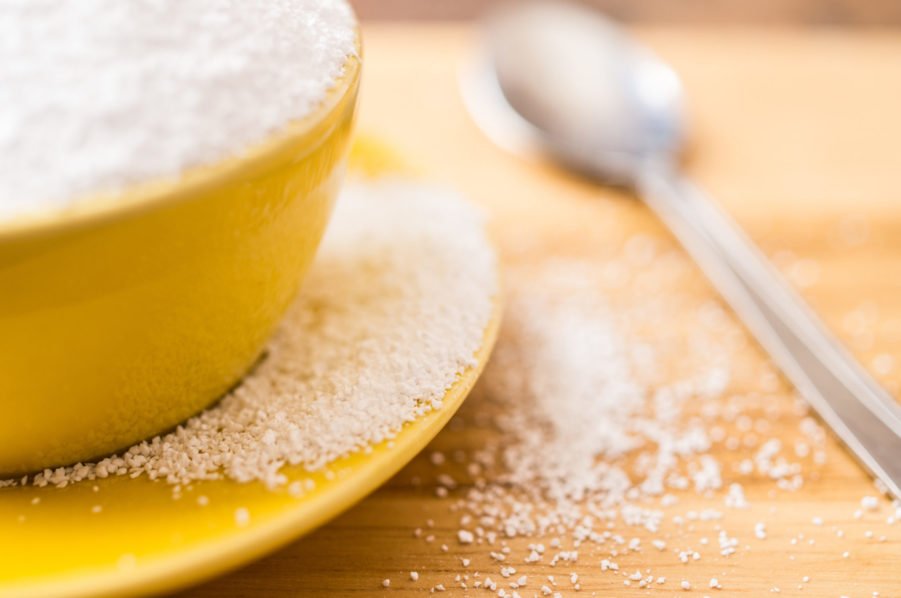Dietitian Blog, Health/Wellness, MNT Guidelines, Patient Blog, Weight Management | May 27 2022
Sweet truth: A review of non-nutritive sweeteners

The blue, the pink, the green, and the yellow. Non-nutritive sweeteners (also known as artificial sweeteners or sugar substitutes) can be a topic of debate for dietitians and clients alike. Are they safe? Do they cause weight gain? How do they affect blood sugar levels? Find out if you should be recommending these sweet nothings.
Are sugar substitutes safe?
In a word, yes. The Food and Drug Administration (FDA) has approved the use of the following non-nutritive sweeteners: acesulfame potassium, aspartame, neotame, saccharin, sucralose, and stevia. Concerns have circulated over the years that artificial sweeteners may be associated with increased risks of cancer.
These fears originate from animal studies, during which mice developed cancer when they were fed high doses of non-nutritive sweeteners. These studies have been examined closely and so far, no translation of carcinogenic effects has been observed in humans.
Do artificial sweeteners increase appetite or cause weight gain?
The relationship between sugar substitutes and appetite is complex. Just like the studies examining the effects of sweeteners on cancer risk, researchers have observed changes in appetite hormones in mice when they are fed artificial sweeteners …but these effects haven’t been duplicated in humans.
In fact, the opposite has been noted — humans tend to eat less and experience weight loss when they are regularly consuming non-nutritive sweeteners. Despite some one-off studies, most research completed with human subjects does not indicate that artificial sweeteners increase appetite or cause weight gain.
How do non-nutritive sweeteners affect blood sugar levels?
Extensive research shows that non-nutritive sweeteners do not raise blood sugar levels. Sucralose has been targeted recently as potentially boosting the spike in blood sugar when carbohydrates are eaten with or soon after sucralose. In addition, sucralose has been blamed for raising the risk of Type 2 diabetes. Multiple studies have refuted these ideas.
In nutrition research, it is often difficult to find a causal relationship between food and a health outcome because there are so many other influences that can interfere. The same is true with these studies; consider all of the influences that impact the risk of developing Type 2 diabetes. Imagine sifting through age, body weight, ethnicity, and genetic predisposition (just to name a few) to discover that sucralose — yes, sucralose! — causes Type 2 diabetes. Seems unlikely, right?
So, if you are still wondering whether you should recommend non-nutritive sweeteners to your patients and clients, there is no reason not to. They are safe alternatives to sugar, which may be appropriate for individuals who need to restrict dietary concentrated sweets.
If you have more questions about non-nutritive sweeteners and diabetes management, it’s always a great idea to speak with a registered dietitian. Registered dietitians are the only credentialed experts qualified to address your unique health questions.
References:
Artificial sweeteners and cancer. National Cancer Institute website. https://www.cancer.gov/about-cancer/causes-prevention/risk/diet/artificial-sweeteners-fact-sheet. Updated August 10, 2016. Accessed November 1, 2018.
Everything you need to know about aspartame. International Food Information Council Foundation website. https://www.foodinsight.org/articles/everything-you-need-know-about-aspartame. Updated November 1, 2018. Accessed November 1, 2018.
Everything you need to know about stevia sweeteners. International Food Information Council Foundation website. https://www.foodinsight.org/Everything_You_Need_to_Know_About_Stevia_Sweeteners. Updated October 16, 2018. Accessed November 1, 2018.
Everything you need to know about sucralose. International Food Information Council Foundation website. https://www.foodinsight.org/articles/everything-you-need-know-about-sucralose. Updated September 20, 2018. Accessed November 1, 2018.
Nutritive and nonnutritive sweeteners. United States Department of Agriculture website. https://www.nal.usda.gov/fnic/nutritive-and-nonnutritive-sweetener-resources. Accessed November 1, 2018.
Who we are
Dietitians On Demand is the nationwide leader in providing dietitians with jobs they love. If flexibility, competitive pay, a full benefits package, free CPEUs each month and a team dedicated to dietitians sound good to you, apply to our positions today.





